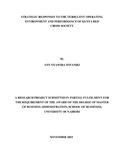| dc.description.abstract | Organizations exist in turbulent operating environment. For organizations to survive in such kind of environment,
there is need for them to adopt strategies that helps them to respond to the effect of such turbulent operating
environment. To the researcher’s knowledge, and at the time of the study, no local or international studies had ever
focused on determining the strategic responses adopted by KRCS cope with the turbulent operating environment and
its performance. This represents a significant gap in knowledge that must be bridged since KRCS is one of the
largest NGO in Kenya that is always on the front line in alleviating human suffering. It is in this light that the
researcher aimed to fill the existing gap by carrying out an investigation into the strategic responses adopted by
KRCS to cope with turbulent operating environment and its performance. In this study, the research design adopted
was case study as it was ideal due to the fact that there is only one unit of study. Content analysis was adopted to
analyze the data collected from the seven key departmental managers that were interviewed. From the study it is
evident that KRCS operations are affected a great deal by the effects of the unpredictable environment it operates in.
As such, KRCS has adopted strategies to deal with this environmental factors and ensure that they do not pull the
organization down as it tries to achieve its set goals and objectives. It is also clear from the study that KRCS is keen
on measuring performance and has adopted the balance score card as a tool of measuring performance to always
ensure that its activities are in line with set goals and objectives. This study has implication to both theory, policy
and practice. From the study it is evident that KRCS performance and operation will always be affected by
unpredictable environmental factors as a result of its existence in turbulent operating environment. It is therefore
important that KRCS adopts strategies of dealing with this environmental factors. KRCS also need to measure
performance frequently to ensure that their performance is in line with the set goals and objectives. This applies to
all organizations in practice. The study would be of importance in enhancing management theories since NGOs
would be in a position to restructure their performance in such a way as to enable them meet overall organizational
effectiveness and performance. The NGO Council that regulates all NGOs would be informed on the situation on the
ground concerning NGOs to enable it offer the necessary support. The Kenyan government would also get better
informed when formulating policies and regulations that affect or relate to NGOs. The study also highlighted the
overall organizational effectiveness and performance and also in policy formulation, especially at the institutional
level. Future scholars can use the results of the study as a source of reference. The findings of this study can be
compared with strategic management in other sectors to draw conclusions on various ways an organization can
respond to competitive forces in the environment, contributing to theory building. To sum up, the study findings can
add some knowledge to the existing body of knowledge and open up areas for further research. The findings would
contribute to generation of knowledge on the competitive strategies employed by Non-Governmental Organizations
in order to enhance performance resulting into theory building. | en_US |

